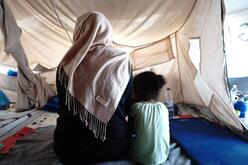Psychologist Kiki Michailidou leads the International Rescue Committee’s response to mental health on islands Lesbos and Chios in Greece. She works with people living in Moria, a ‘reception centre’ run by the Greek government, where over 8,500 people are currently crammed into a space that has capacity for just 3,100. Thousands of asylum seekers who have fled wars in Syria, Iraq and Afghanistan are being forced to live in horrific conditions, waiting many months for their cases to be heard. Kiki describes the desperate situation her clients are facing and what needs to change.
People living in Moria are in a constant state of insecurity, danger and fear. They left their country to feel safe and they have come to a place that doesn’t offer them safety.

They tell us that situations in Moria are as frightening as those in the country they’ve fled. They’re facing conflicts on a daily basis, they’re scared to walk outside their tents, to go to the bathroom or to have a shower.
In many cases, they don’t even feel secure inside their tent because they are being harassed by the people they live with. We have clients who have difficulty sleeping and when they wake up in the middle of the night, they wake up in terror, shouting and having flashbacks. People ask them to leave the tent when sleeping next to them becomes too difficult.
Living in Moria makes our clients feel like there is no hope. The asylum procedure takes so long, it leaves people stuck for months and months whilst their mental health grows increasingly worse.
Recently, one of my clients tried to kill himself. He, and two others, attempted suicide. One of them sadly died. All our clients are in a similar state. As a team, we’re in a state of constant worry about people ending their lives.
The backlog for an appointment at the public hospital is immense and there is only one psychiatrist there. One of our clients, a young man, was experiencing hallucinations and was admitted to hospital. He was discharged after three days, despite having serious suicidal tendencies. He was referred to us as an urgent case – but we weren’t able to send him back to the hospital as he’d been discharged. We spent two days in touch with him constantly on the phone and in person, making sure that he was okay and that he was able to see a psychiatrist.
We support our clients as best we can, but when they have to go back to Moria, a lot of that works gets undone. They have no safety net. Many people arrive with mental health difficulties because of the extreme adversity they’ve faced in their home country. But even if you don’t have problems, living in Moria under these conditions will impact your mental health. It’s not normal to be living in a cramped camp that’s hosting over 8,500 people when it’s only fit for 3,000.
There are thousands of people in need of support – but the services just aren’t there. Currently, there are only five government-funded psychologists working in Moria and the lack of safe places to run sessions means that they’re only able to work one shift at a time.
Our clients and all vulnerable people need to be moved out of Moria, urgently. Everyone living there needs more space or problems will continue to increase.
Additional resources are needed to ensure that everyone who needs psychological help receives it. The work we do at our clinic in Mytilene only scratches the surface. Far too many people at Moria are in an incredibly vulnerable place. We must do more.
Read more
The International Rescue Committee's latest report 'Unprotected, unsupported, uncertain' shows that asylum seekers living in Moria are under huge mental strain and puts forward recommendations to ensure people can access mental health services and that living conditions do not trigger or exacerbate existing trauma.
Funding for the IRC’s mental health and psychosocial support clinic on Lesvos is provided by Stichting Vluchteling, Stavros Niarchos Foundation, and Malcolm Hewitt Wiener Foundation.